Braided Waters: Environment and Society in Molokai, Hawaii
The Western Environment: Wade Graham In Conversation with Daniel Lewis
December 5, 2018
The Huntington
Braided Waters sheds new light on the relationship between environment and society by charting the history of Hawaii’s Molokai island over a thousand-year period of repeated settlement. From the arrival of the first Polynesians to contact with eighteenth-century European explorers and traders to our present era, this study shows how the control of resources—especially water—in a fragile, highly variable environment has had profound effects on the history of Hawaii. Wade Graham examines the ways environmental variation repeatedly shapes human social and economic structures and how, in turn, man-made environmental degradation influences and reshapes societies. A key finding of this study is how deep structures of place interact with distinct cultural patterns across different societies to produce similar social and environmental outcomes, in both the Polynesian and modern eras—a case of historical isomorphism with profound implications for global environmental history.
-
Wade Graham is the author of Dream Cities: Seven Urban Ideas That Shape the World and American Eden, a cultural history of gardens in America. He teaches urban and environmental policy at Pepperdine University’s School of Public Policy.
-
Daniel Lewis is Dibner Senior Curator for the History of Science and Technology at The Huntington Library and teaches at the California Institute of Technology and Claremont Graduate University. His newest book is Belonging on an Island: Birds, Extinction, and Evolution in Hawai’i (2018).
The Ecocentrists: A History of Radical Environmentalism
The Western Environment: In Conversation with Keith Makoto Woodhouse
November 15, 2018
The Huntington
In his recent book The Ecocentrists: A History of Radical Environmentalism (2018), Keith Makoto Woodhouse offers a nuanced history of radical environmental thought and action in the late-twentieth-century United States focusing especially on the group Earth First!. A groundbreaking intellectual history of environmental politics in the United States, The Ecocentrists is a timely study that considers humanism and individualism in an environmental age and makes a case for skepticism and doubt in environmental thought.
-
Keith Makoto Woodhouse is an assistant professor at Northwestern University, where he teaches in the History Department and the Environmental Policy and Culture Program.
Over LA: Aerial Accounts
November 3, 2018
USC Doheny Memorial Library 240
What’s over Los Angeles? Sun and sky, trees and buildings, birds, bugs, and flying machines: Angelenos live in a city marked by three dimensions, in which what we encounter overhead is as essential as what lies beneath our feet. “Over L.A.: Aerial Accounts” was a day-long conference investigating this under-appreciated aspect of Southern California — its past, present, and future. Mixing panel discussions, interviews, and brief, impressionistic interludes, we will explore the special qualities of Southland sunlight and the biodiversity of flora and of fauna; the influence of zoning and of the overlays of redlining; the peculiar relationship of helicopters to the city’s architecture and imagery; and the future of taxi drones.
This programming is brought to you by the Huntington-USC Institute on California and the West, the USC Sidney Harman Academy for Polymathic Study, and the USC Libraries Collections Convergence Initiative (CCI).
_________________________________________________________________________
California Greenin’: How the Golden State Became an Environmental Leader
The Western Environment: In Conversation with David Vogel
October 25, 2018
Ahmanson Room, Botanical Center, The Huntington
From its historic protection of Yosemite in 1864 to its contemporary initiatives to address the risks of global climate change, California has long been on the cutting edge of environmental policy leadership and innovation in the United States. In California Greenin’, David Vogel illustrates the critical roles played by the state’s attractive natural environment, the threats to that environment due to rapid economic growth and the economic value of its natural resources, extensive citizen mobilization and businesses that found it in their interests to support more extensive environmental regulation. Also detailed are the state’s environmental policy shortcomings, most notably its water management and continued dependence of motor vehicles.
-
David Vogel recently retired from 42 years on the faculty of the Department of Political Science and the Haas School of Business at the University of California, Berkeley. Vogel has written extensively on government regulation and environmental policy in the United States, Europe, and internationally. His books include The Politics of Precaution, Trading Up, National Styles of Regulation, and The Market for Virtue. In 2017 he received a lifetime achievement award from the American Political Science Association for his research on environmental policy.
Migrant Letters: The Chinese and Mexican Experience
October 13, 2018
Ahmanson Room, Botanical Center, The Huntington
What do the letters of Mexican and Chinese migrants voice about their stories in California’s history of migration? A symposium co-sponsored by the Huntington-USC Institute on California and the West and The Huntington Library explored this question by examining twentieth-century Mexican and Chinese migrant letters as sources in writing this history. Besides this important question, the symposium also seeks to highlight, as well as to understand, historian José Orozco’s important—and poignant—declaration that migrant letters are “the quieter affirmations of humanity, those simple exchanges … expressions of love … scribbled in ink that fades, written on paper that yellows.”
This programming is brought to you by the Huntington-USC Institute on California and the West and The Huntington Library.
_________________________________________________________________________
Miriam Pawel on California Dynasty: The Browns and the State They Shaped
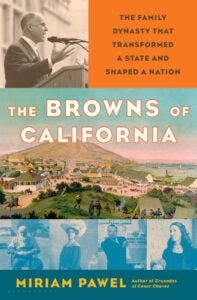
October 10, 2018
USC Doheny Memorial Library 240
From the Prussian pioneer who arrived in Colusa in 1852 through his great grandson, the oldest and longest-tenured governor in state history, Miriam Pawel examines how four generations of a remarkable family came to play such a vital role in shaping California. Drawing heavily on archival materials, including the Jerry Brown papers at USC, and supplemented with extensive interviews, she uses the family as a lens through which to narrate a history of the Golden State.
-
Miriam Pawel is a journalist, author, and independent historian. The Browns of California is her third book; she also wrote the first biography of Cesar Chavez and a history of the United Farm Workers. She spent 25 years as an award-winning reporter and editor at Newsday and the Los Angeles Times before turning to narrative non-fiction.
California, Birthplace of the Hispanic Conservative Movement
The Western Environment: In Conversation with Geraldo L. Cadava
October 2, 2018
Ahmanson Classroom, Botanical Center, The Huntington
Join Geraldo L. Cadava, associate professor of History at Northwestern University, as he discusses current research for his forthcoming book about the Hispanic Conservative Movement from the 1960s until the 1990s. This thirty year period was bookended by the founding of the Republican National Hispanic Assembly and Proposition 187, which split the group in two and ultimately led to its dissolution. During this period, Republican leaders went from calling for amnesty to calling for the construction of imposing border walls. As the party took a hard right turn on immigration, Hispanic conservatives no longer found it to be a welcoming home for them. In many ways, the birthplace of the Hispanic Conservative Movement (and maybe its burial site, too) was in California and the American West, not the 90-mile-wide strait between Havana and Miami, as many would assume.
-
Geraldo L. Cadava is from Tucson, Arizona. He received a B.A. from Dartmouth College and a Ph.D. from Yale University. His first book, Standing on Common Ground: The Making of a Sunbelt Borderland (Harvard University Press, 2013), won the Frederick Jackson Turner Award from the Organization of American Historians.
A Career Outside Academia, In Context
September 24, 2018
USC Doheny Memorial Library 241
Join us for a conversation with David Levitus (2013 USC History Ph.D.) about the path to career outside academia that makes use of the historical knowledge and skills honed inside the academy. He shared the story of his own circuitous journey to establish and run a social justice organizing nonprofit in the five years after grad school and the hard lessons learned along the way. He also discussed the relationship between history and contemporary political and social change work and a whole lot more!
-
David Levitus earned his Ph.D. in History from USC in 2013. Since graduating, he’s gone on to become the Founder & Executive Director of LA Forward, which activates a rising generation of Angelenos to create a fair, flourishing Los Angeles. Through grassroots organizing, digital mobilization, and civic media, LA Forward connects people with opportunities to partners with groups representing disadvantaged communities in order to change the policies and systems that limit our collective potential. The organization is a culmination of what he learned in fifteen years of work in organizing and policy advocacy in Los Angeles, New York, and Washington, DC — including extensive volunteering during grad school. Over the last year, he’s published long-form essays on progressive politics and urban policy in the LA Review of Books and Streetsblog Los Angeles. He’s a Board Member with LA Voice Action and served previously on the West LA Neighborhood Council.
Slick Policy: Environmental and Science Policy in the Aftermath of the Santa Barbara Oil Spill
The Western Environment: In Conversation with Teresa Sabol Spezio
September 17, 2018
Ahmanson Classroom, Botanical Center, The Huntington
In January 1969, the blowout on an offshore oil platform off the coast of Santa Barbara, California and the resulting oil spill proved to be a transformative event in pollution control and the nascent environmental movement. It accelerated the advancement of environmental policies and would change the way the government managed pollution. Slick Policy presents an original history of the 1969 spill. In this discussion, Teresa Sabol Spezio explores how scientists and politicians used public outrage over the spill to implement wide-ranging changes to federal environmental and science policy, and demonstrates the advancements to offshore oil drilling, pollution technology, and water protection law that resulted from these actions.
-
Teresa Sabol Spezio is a visiting assistant professor in environmental analysis at Pitzer College in Claremont, CA. She is a licensed professional engineer who has worked in the environmental field.
Western Histories in the Making: Graduate Student Presentations
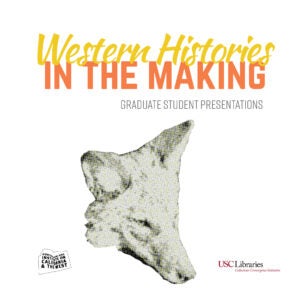
August 15, 2018
USC Doheny Memorial Library 240
Presented by ICW and CCI at the second Western Histories in the Making, three graduate students presented their work and their research paths to continue fostering a connection between ICW and Doheny Library.
-
“Harvesting Winter – The Natural Ice Trade in the American West”
Jordan Keagle’s research ties together two broad narratives, the “conquering” of the Western environment and the rise of capitalism, by examining a curious commodity: ice. Specifically, his work reconstructs the natural ice industry in the Pacific West in the nineteenth century. In his presentation, Keagle will argue that ice was itself a critical raw material in the building of the West—one that has been so far overlooked despite its interconnection with other industries and products. His paper illustrates the opportunities the ice trade offered consumers and the lengths to which Westerners went to obtain a measure of control over their environment.
-
“Go After the Boys: The Spanish American Institute and Ethnic Boundary-Making in Early Twentieth Century California”
Religious-based Americanization projects helped create the boundaries of an ethnic identity based on Anglo-Protestantism in early twentieth century American history. Although Americanization projects have largely been seen as imposed on communities of color Navarrete Hunter’s paper will show how Mexican families engaged in the process of ethnic boundary-making when sending their boys to the Methodist-run Spanish American Institute, a boarding school for Mexican boys, in Gardena, California. By looking at parental engagement in records archived at The Huntington Library, alongside publications produced by the boys at the institute archived at Doheny Library, this paper shows the dynamic process of identity and boundary-making and the social landscape on which it took shape.
-
“Omaha Affairs: Prostitutes, Railroads, and Divorce in Progressive Era Omaha”
When Mary McKeen remarried, she perhaps thought the only reminder of her ex-husband would be the regular alimony payments he was expected to make. But in 1912, Omaha coal magnate Charles Hull sued McKeen and her new husband, William R. McKeen, Jr., in an attempt to get out of paying the $91,000 (over $2 million today) he owed to her. What Hull apparently failed to predict was the counter strategy that the McKeens would employ in attempts to expose Hull’s infidelity and promiscuous behavior. The McKeens’ lawyers began interviewing a who’s who of Omaha movers and shakers, including powerful businessmen, country club employees, and the gamblers and prostitutes of Omaha’s notorious Third Ward. Daniel Wallace’s project analyzes this high-drama story and its implications regarding divorce, prostitution, race, and class in 1912 Omaha.
Look What I Found: Lynell George on Octavia E. Butler
June 22, 2018
Writer Lynell George is the 2018 Huntington Library Alan Jutzi Fellow for her work with the Octavia E. Butler Archive. Octavia E. Butler (1947-2006) was a renowned science fiction writer whose body of work helped launch a new genre called Afro-Futurism. Butler was the first black woman to gain prominence in a genre that flirts with the supernatural. Honored with both Hugo and Nebula awards, Butler was also the first science fiction author to be awarded a MacArthur “Genius Grant” in 1995.
“Look What I Found” is a video series produced by the Huntington-USC Institute on California and the West to showcase discoveries coming out of the archive. We interview scholars who emerge from the archives with ideas, sources, mysteries, and assumptions about their work in the history and culture of the American West.
-
Lynell George is an L.A. based journalist and essayist. She is the author of the recently published book After/Image: Los Angeles Outside the Frame as well as No Crystal Stair: African Americans in the City of Angels, and the winner of a 2017 Grammy Award for her notes for the box set Otis Redding Live At The Whisky A Go Go: The Complete Recordings.
Migrant Longing: Letter Writing across the U.S.-Mexico Borderlands
ICW In Conversation with Miroslava Chávez-García
May 3, 2018
The Huntington
Miroslava Chávez-García joins ICW Director William Deverell to discuss her new book Migrant Longing: Letter Writing across the U.S.-Mexico Borderlands.
-
Miroslava Chávez-García is Professor in the Department of History at the University of California at Santa Barbara and holds affiliate status in the Departments of Chicana and Chicano Studies and Feminist Studies. She is also currently the Faculty Director of Graduate Diversity Initiatives. Chávez-García is author of Negotiating Conquest: Gender and Power in California, 1770s to 1880s (University of Arizona Press, 2004) and States of Delinquency: Race and Science in the Making of California’s Juvenile Justice System (University of California Press, 2012). Her most recent book, Migrant Longing: Letter Writing across the U.S.-Mexico Borderlands (University of North Carolina Press, 2018), is a history of migration, courtship, and identity as told through more than 300 personal letters exchanged among family members and friends across the U.S.-Mexico border in the 1960s and 1970s. Most recently, Chávez-García received the Western Association of Women’s Historians Judith Lee Ridge Prize for the best article by any member of the organization for “Migrant Longing, Courtship, and Gendered Identity in the U.S.-Mexico Borderlands”, published by the Western History Quarterly in Summer 2016. In November 2017, that same essay received the Bolton-Cutter Award from the Western History Association for the best article on Spanish Borderlands history.
War and the Weather: a project by Enid Baxter Ryce
ICW In Conversation with Enid Baxter Ryce
April 26, 2018
The Huntington
Featuring the music of Philip Glass, “War and the Weather” a project by Enid Baxter Ryce is a work-in-progress that explores the impact of atmospheric rivers on the colonization, conspiracy and politicization of the American West through film and painting.
-
Enid Baxter Ryce (nee Blader) is an artist, filmmaker and musician. She grew up in a strip-mining town that was also a Revolutionary War reenactment park. Her works have exhibited internationally at venues including the National Gallery of Art and Library of Congress, Washington, D.C; the J.P. Getty Museum, Director’s Guild of America and Museum of Contemporary Art, Los Angeles; Location One and Academy of Art and Sciences, New York City; Sundance, Park City UT; The Kunsthalle Vienna; The Arnolfini in London; Center for Contemporary Arts, Glasgow; CCA Andratx, Mallorca and has been written about in The New York Times, Artforum, Artreviews, The Los Angeles Times, and many others. She has won awards for her work as an artist and arts educator. Enid studied fine art at The Cooper Union for the Advancement of Science and Art, Yale University and Claremont Graduate University. She is Professor of Cinematic Arts and Environmental Studies and Director of the California State University Monterey Bay Salinas Center for Arts and Culture.
Alta: A New Magazine for California
ICW In Conversation with Mark Potts
April 23, 2018
Munger Research Center, The Huntington
Mark Potts is the managing editor of Journal of Alta California (Alta), the quarterly magazine founded by William R. Hearst III. He joins ICW Director William Deverell to talk about Alta.
-
Mark Potts is the managing editor of Journal of Alta California (Alta), the quarterly magazine founded by William R. Hearst III. Over the past 25 years, Mark has been an innovator in print and online media. He created one of the first electronic news prototypes in the early 1990s, and then co-founded The Washington Post Co.’s digital division. He was a member of the founding team of @Home Network, where he led the creation of the first consumer broadband programming service. As co-founder of Backfence and GrowthSpur, Mark was a pioneer in the field of hyperlocal media. A longtime journalist, he was a reporter and editor for The Washington Post, Chicago Tribune, San Francisco Examiner and Associated Press, and was editor of the Lawrence (KS) Journal-World when it was named one of “10 Newspapers That Do It Right” by Editor & Publisher in 2013.
V.N. Trinh on “No Humans: Race, Citizenship, and the Los Angeles Police Department, 1973-1992”
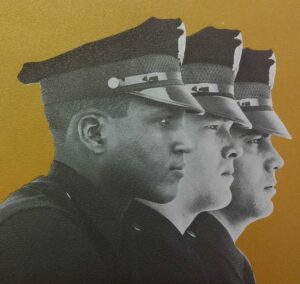
April 18, 2018
USC Doheny Memorial Library 240
V.N. Trinh investigates the interplay between racialized notions of citizenship and a rapidly transforming police force in Southern California. In doing so, he critically narrates the stories of black policemen and policewomen who saw in the LAPD a special opportunity to both defend their communities from crime and bear the uniform’s respect. Building upon other scholarship on race and policing and using materials from USC Libraries, Trinh’s project interrogates contemporary assumptions about racial liberalism, diversity, and affirmative action.
This programming is brought to you by the Huntington-USC Institute on California and the West, the USC Libraries Collections Convergence Initiative (CCI), and the USC Sidney Harman Academy for Polymathic Study.
-
V.N. Trinh is a doctoral candidate in the History Department at Yale University. His dissertation-in-progress, “Burning All Illusions: Race and Rebellion in the City of Angels, 1950-1992,” uncovers black and Korean Angelenos’ entangled relationships with the police, with respectability politics, and with each other.
Belonging on an Island: Birds, Extinction, and Evolution in Hawai’i
ICWIn Conversation with Daniel Lewis
April 13, 2018
Munger Research Center, The Huntington
Daniel Lewis discusses the shifting and complex meanings of being “native” and his new book, Belonging on an Island: Birds, Extinction, and Evolution in Hawai’i with ICW Director William Deverell.
-
Daniel Lewis is the author of Belonging on an Island: Birds, Extinction, and Evolution in Hawai’i. He is also Dibner Senior Curator for the History of Science and Technology at The Huntington Library and teaches at the California Institute of Technology and Claremont Graduate University. His previous books includes The Feathery Tribe” (Yale, 2012) and “Iron Horse Imperialism (U of Arizona Press, 2007).
Angel’s Gateway: Los Angeles and its Port
ICW In Conversation with Geraldine Knatz
March 27, 2018
The Huntington
Geraldine Knatz joins ICW Associate Director Elizabeth Logan to talk about her new book, Angel’s Gateway: Los Angeles and its Port.
-
Geraldine Knatz is a Professor of Practice with a joint appointment in USC’s Viterbi School of Engineering and the Price School of Public Policy. The former Director of the Port of Los Angeles, since her retirement four years ago, Knatz has focused on telling the history of the Port of Los Angeles from the perspective of the people that lived there (Terminal Island, The Lost Communities of Los Angeles Harbor) and now her latest project, the people who worked there. Angel’s Gateway is the history of the Port of Los Angeles from the perspective of city and harbor officials, businessmen and private citizens whose names may not be familiar to many because their actions, contributions and disputes have never been chronicled before. Some of these people were visionaries, some were greedy. Some believed in serving the city, some believed in serving themselves. The consequences of their actions and the decisions they made explain the harbor we have today. This work gives voice to their role in the governance of the Port of Los Angeles.
William Cronon on “The Portage: How to Read a Landscape”
Gary B. Cohen Distinguished Lectureship in History
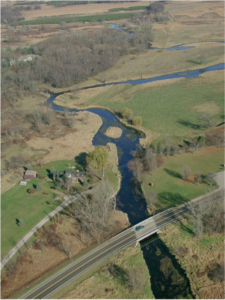
March 19, 2018
USC Doheny Memorial Library 240
In a lecture based on the opening chapter of the book he is writing on the history of Portage, Wisconsin, environmental historian William Cronon meditates on the role of memory and storytelling in the complicated ways human beings construct their individual and collective sense of place. A natural ecosystem or an abstract geographical space becomes a human place, he argues, through the endless accretion of narratives that render that place meaningful for those who visit or live in it. Portage is an especially interesting community in which to explore this idea, since it was the home town of Frederick Jackson Turner, the American historian who authored the famous “frontier thesis.” It was also the town into whose hinterland John Muir migrated as an eleven-year-old boy from Scotland, and the town where Aldo Leopold’s “Shack,” famed subject of the book A Sand County Almanac, is located. Although virtually unknown to most Americans, few places have played so central a role in shaping our national ideas of nature.
This programming is brought to you by the Gary B. Cohen Distinguished Lectureship in History Fund, the USC Dornsife Department of History, and The Huntington-USC Institute on California and the West. Thanks to the History Graduate Student Association for organizing this event.
-
William Cronon studies American environmental history and the history of the American West. He is the Frederick Jackson Turner and Vilas Research Professor.
Cronon’s work seeks to understand the history of human interactions with the natural world: how we depend on the ecosystems around us to sustain our material lives, how we modify the landscapes in which we live and work, and how our ideas of nature shape our relationships with the world around us. Cronon has authored Changes in the Land: Indians, Colonists, and the Ecology of New England (1983), which was awarded the Francis Parkman Prize of the Society of American Historians and Nature’s Metropolis: Chicago and the Great West (1991). Nature’s Metropolis was awarded the Bancroft Prize for the best work of American history and the George Perkins Marsh Prize from the American Society for Environmental History, and many other awards.The History Graduate Student Association is pleased to welcome Professor Cronon as the inaugural lecturer of the Gary B. Cohen Distinguished Lectureship in History.
Mark Padoongpatt on Flavors of Empire: Food and the Making of Thai America
March 12, 2018
Munger Research Center, Seaver Classrooms, The Huntington
Join ICW and Mark Padoongpatt at The Huntington as he discusses how and why Thai food has shaped Thai American community and identity since World War II.
-
Mark Padoongpatt is Assistant Professor of Asian and Asian American Studies and of Interdisciplinary Studies at the University of Nevada, Las Vegas. He received his Ph.D. in American Studies & Ethnicity at the University of Southern California in 2011. His research centers on the experiences of Asian Americans and Pacific Islanders in the twentieth century United States. His new book, Flavors of Empire: Food and the Making of Thai America (University of California Press, American Crossroads series), explores how and why Thai food has shaped Thai American community and identity since World War II. He argues that foodways, more than just cultural heritage, became an indispensable part of the Thai American experience because of the confluence of U.S. Cold War intervention in Southeast Asia, the rise of discretionary leisure spending and consumer services, and the ascension of Los Angeles as a multicultural global city over the second half of the twentieth century. The book stands as the first historical examination of Thai Americans.
The Law of the United States-Mexico Border: A Casebook
ICW In Conversation with Peter L. Reich
February 22, 2018
Munger Research Center, Seaver Classrooms, The Huntington
Peter L. Reich joins ICW Associate Director Elizabeth Logan to talk about his book, The Law of the United States-Mexico Border: A Casebook.
-
Peter L. Reich received his J.D. from UC Berkeley and Ph.D. in modern Latin American history from UCLA. He is Lecturer in Law at UCLA School of Law, where he teaches constitutional Law, contracts, evidence, and academic support to foreign law students pursuing the LL.M. degree. Professor Reich was formerly Associate Dean and Professor of Law at Whittier Law School, where he taught environmental Law, law of the U.S.-Mexico border, real property, and water Law. He also serves as a thesis supervisor for Harvard University’s Graduate Program in Sustainability and Environmental Management. Professor Reich’s research focuses on the environmental law of Latin America and the U.S. Southwest, and he has published numerous books and articles. He has received Fulbright, Social Science Research Council, Rocky Mountain Mineral Law Foundation, and Huntington Library fellowships. Professor Reich’s The Law of the United States-Mexico Border: A Casebook was just released by Carolina Academic Press. As an expert on Mexican and U.S. environmental law, he prepares legal documents, testifies in court proceedings, and consults on litigation and appellate strategy.
Reconsidering the Spanish Colonial Revival in California
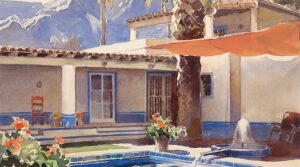
February 5, 2018
Brown Auditorium, LACMA
William Deverell, Director of the Huntington-USC Institute on California and the West, moderates a panel discussion on Spanish Revival forms, materials, inspirations, and consequences.
The discussion draws from the Spanish Colonial Revival exhibition, “Found in Translation: Design in California and Mexico, 1915–1985,” on view at the Los Angeles County Museum of Art, part of the Getty Foundation’s Pacific Standard Time: LA/LA initiative. Panelists include LA Times architecture critic Christopher Hawthorne, entrepreneur Cedd Moses, theater artist Theresa Chavez, and Julianne Polanco, California’s State Historic Preservation Officer.
___________________________________________________________________
“California’s Culture of Flowers”
ICW In Conversation with Elizabeth A. Logan
January 25, 2018
Munger Research Center, Seaver Classrooms, The Huntington
Huntington-USC Institute on California and the West Associate Director Elizabeth Logan discusses her work on California’s culture of flowers from the late 19th century to the Panama Pacific Exposition in 1915 with Director William Deverell. As California floriculturists transformed their spaces from what they originally saw as blank canvases, they created an international garden of landscape and commerce. From wild botanizing to flower shows to scientific experimental botany, their stories blend with broader notions of landscapes as cultural markers of the state of current and future communities.
-
Elizabeth A. Logan received her undergraduate degree from Stanford University in History with honors, her JD from the UCLA School of Law, and her Ph.D. from the University of Southern California. She serves as the Associate Director of ICW and the Executive Director of the Los Angeles Service Academy (LASA). Her previous work includes positions as an Assistant Editor of Boom: A Journal of California and as a Dornsife Preceptor. Her teaching and work explores the intersections of law, history and culture in the 19th- and early 20th-century United States and American West.